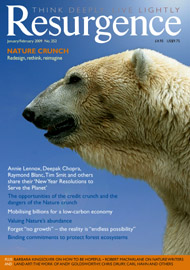NOEL CHARLTON’S LOVE and respect for his subject shine through this excellent study. He is scholarly in charting Gregory Bateson’s early influences and intellectual development; he carefully elucidates key concepts, and keenly explores his proposed solution to our ills: namely, communion with Nature through the arts, ritual and reverence – all activities that, once participated in, forever influence our values and priorities. For Bateson, a fourth-generation atheist from an elite intellectual circle of Cambridge scientists, evolutionists and geneticists, this was a way of being and knowing that was hard won.
Though he died in 1980, he is, as his daughter Mary Catherine writes, “a remarkably persistent shade”. It became obvious to him, sceptical as he was about political solutions for ecological predicaments, that when power prevails over grace, human purposiveness is destructive in its effects. His were a large presence and a huge mind conversant with many dimensions: the poetry of William Blake was an early and surprising family influence in that scientific household.
His father’s eminence as the founder of modern genetics, theories of evolution and field trips to study Nature were the language of his childhood. Having to make his escape from parental persuasion, Bateson chose anthropology because he had begun to glimpse that relationality in all things is the key to understanding the nature of mind. (He later developed the lovely idea of “nested minds” – minds within minds.)
Thereafter he traversed cybernetics. He explored psychology, inventing, on the basis of childhood family friends Russell and Whitehead’s Principia Mathematica, the double bind theory of schizophrenia: that a person becomes deemed schizophrenic when he or she embodies impossible paradoxes of contradictory demands in a family system resulting in personal paralysis (not a bad metaphor for our collective relationship to eco-catastrophe). He considered animal intelligence, discovering that whales, dolphins and all kinds of creature can learn to learn. Finally, he embraced an enlarged view of ecology. He had read Rachel Carson’s seminal book Silent Spring early and with alarm, and increasingly suffered the visible degradation of all the biological systems upon which we depend. His early delight in Nature’s intricate patterns, checks and balances of which we are a part (rather than from which we are apart, the preferred human default position) informed his adult distress at their erosion. If you know what was in the hedgerows you know when it’s not there.
Cybernetics is the study of self-
regulating systems (feedback mechanisms and circular causal systems) in mechanical, biological and social systems, i.e. ones that are based on the mutual communication of error between desired pattern and actuality. Bateson’s version of the ‘survival of the fittest’ is that the unit of survival is not the mammal, but the mammal and environment. No environment: no mammal – a relationship of mutual dependency. Cybernetic ideas and the consequent emergence of concepts of ‘feedback’ negative and positive were, as Charlton describes, of the utmost importance for the development of Bateson’s thought – specifically, for his theory of ‘minds’ as the flow of information around feedback loops in and between all organisms and environments. When these loops maintain homeostasis, such systems are said to be ‘negative’ to change. When loops have gone ‘positive’, deviations from normal are amplified, resulting in escalation of conflict and alienation.
Just before Christmas 1967, Bateson wrote to cybernetic polymath Warren McCulloch, “I begin to wonder whether I am mad” – or whether he’d hit on a crucially significant idea: that lineal human purpose conflicts with the cybernetic, recursively evolved patterns of Nature. “Therefore, following his own purposes, man almost inevitably messes up his own physiology, social system and ecosystem.” He thought that Original Sin might be the discovery of planned purpose, as a result of which Adam and Eve expelled God from the Garden. ‘God’, symbolising the systemic nature of the environment, inevitably took revenge, making everything from gardening to childbirth hard work and dangerous.
It follows that what humanity has done through the ages is to correct for short-sighted purposiveness by imagining personified entities with various supernatural powers, which are really powers embedded in the systems and nested minds of the natural world, of which we have lost awareness. Our collective lineal ‘egoical’ purposes place us in dire opposition to everything that is natural, so there is an awful lot of unlearning to do. Bateson encountered God as grace, intelligently evolving mind, immanent throughout Nature.
It has been a tough and lively pleasure to read Charlton’s valuable contribution to Bateson studies.







